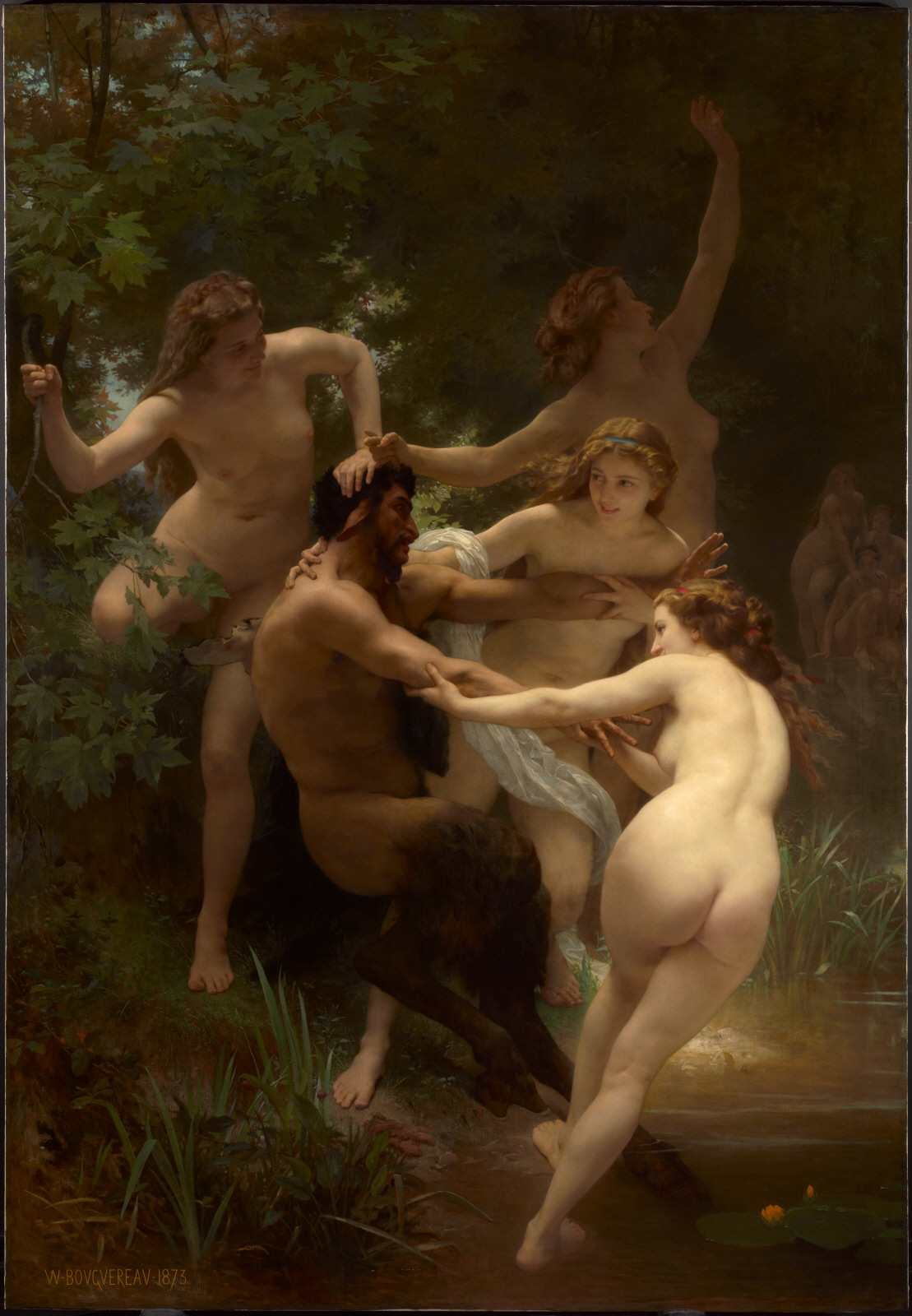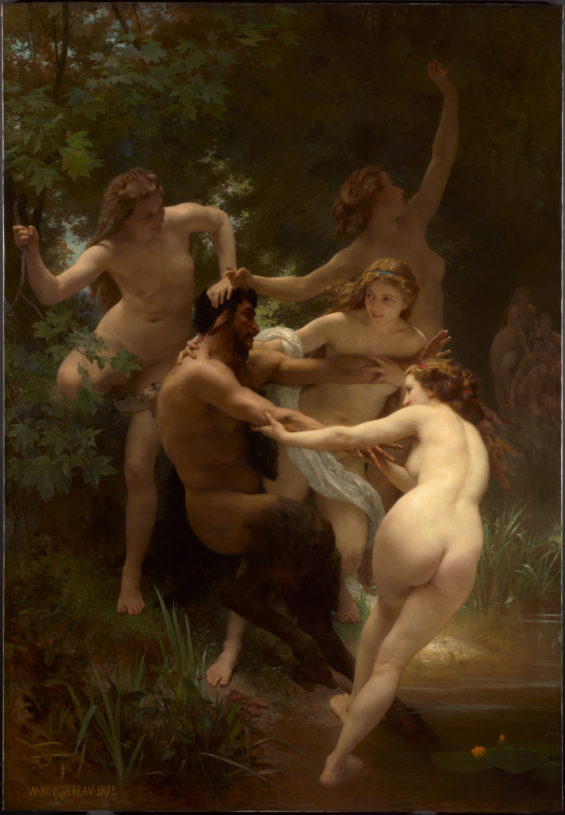The (Very) Bearable Lightness of Being Over the Hill


“Nymphs and Satyr” by William-Adolphe Bouguereau, courtesy of the Clark Art Institute
In early January, French author and filmmaker Yann Moix took a bath into a cauldron of hot water by declaring in an interview with the French edition of Marie Claire that women over age 50 are “too, too old” to love, and thus are “invisible” to him. He based his argument on the highly scientific theory that a 25-year-old woman’s body is “extraordinary,” whereas a 50-year-old woman’s body is “not extraordinary at all.”
Let’s leave aside for the moment that Moix, 50 years old himself, could be attempting to court publicity in a desperate grab at hipness or relevance, or that he might just be missing a few marbles—in the same article, he described himself as a “great feminist,” said white women are “pretentious” and not worth dating, and defended his preference for Asian women because they have an “extraordinary” link with “another cosmos.” Moix’s comments are troubling because, even knee-deep in our era of sexual enlightenment, they reinforce two dangerous stereotypes: that men can’t fight the hard-wired preference for younger women, and that, unlike men, women become less valuable as they age.
When I posted a link to the Guardian’s English-language coverage of the article on my Facebook page, the comments from women were predictably, and justifiably, disgusted, and the comments from men were encouraging. “He has to be a complete idiot. I feel sorry for him that he is blind to so much beauty,” said one male friend. “At his age he should be far more enlightened,” said another. “He’s a complete idiot. Women over 50 are the best lovers,” noted a third, clearly the smartest of the bunch.
But I digress.
On the surface, here’s why Moix’s comments are insulting: they assume all 25-year-olds are stunning and all 50-year-olds are sad, grizzled crones. But dig a little deeper and a darker truth emerges: a woman’s worthiness of basic human respect and affection directly correlates with her sexual attractiveness.
I wish I could say that this is just Moix’s twisted world-view, borne of too many cigarettes, longing gazes out drizzly windows, and general self-importance, but it’s not. It’s a crusty old hetero stereotype that’s been rattling around, Bertha Mason–like, in humanity’s attic pretty much since the beginning of time. It serves only to make some men feel more powerful by convincing women that they have an expiration date, that from puberty until menopause they’re goose-stepping toward a predestined irrelevance.
A 2014 big-data analysis by dating site OKCupid found that women in their 20s and 30s tend to find men a few years older than them to be ideally attractive. This peaks around age 40, when women start to find men three to four years younger than they are to be more attractive. But for men, the tables are more flipped than turned. From the age of 20 into their early 40s, men prefer women in their early 20s. Around 45, men “age up,” preferring women around the ripe old age of 24. After the men round the corner on 45, the age at which women are deemed most attractive dips again, to an average of 22 years old.
As OKCupid president Christian Rudder summarized for us females, “From the time you’re 22 you’ll be less hot than a 20-year-old, based on this data. So that’s just a thing.”
Know what else is just a thing? The fact that we’re still, as a society, complicit in perpetuating this bias. Another dating site, Zoosk, found in 2018—yes, 2018—that 13 percent of all men dating online are actively searching for women more than 10 years younger than they are. (Nota bene: These men get a 3 percent lower response rate than those who stick to their own age bracket—a dismal stat when you consider that for every response, a man typically has to send 25 messages.) When asked about their bias, the most common reply you’ll hear from men who consistently seek out younger women is that it’s a biological imperative—it can’t be helped that they “naturally” prefer youth.
Sure, the age bias has its roots in evolutionary theory: in the earliest days of humankind, the younger female’s enhanced ability to procreate was an advantage over her older counterparts. Conversely, the older male often afforded higher status and the ability to provide for a family.
This was at a time, it bears noting, when most humans didn’t make it much past 35.
Considering that the statistics on health anomalies for children born to both men and women over the age of 45 are similar, there’s no biological basis for the “need to breed” during this time of life. Which also means that in this era of #MeToo and “wokeness,” there’s really no excuse for a man to act like a candidate out of Mad Men Rake Central Casting, assuming an entitlement to youth, beauty, sexual indulgence, and the ability to spread his own genes far and wide—no matter whether they’re past their expiration date.
I’m not going to let women off the hook on this one, either. After Moix’s interview came out, French journalist Colombe Schneck tweeted a photo of her naked rear with the caption, “Voila, the buttocks of a woman aged 52…what an imbecile you are, you don’t know what you’re missing, you and your tiny, paunchy brain.” Beyond its not especially incisive prose, there are a couple of problems with Schneck’s tweet (which since appears to have been removed from her account). First, it attempts to prove attractiveness, which is, of course, subjective, and generally difficult to do when comparing youth and age head-to-head . . . or butt-to-butt, as the case may be. Second, it reduces women yet again to the sum of their body parts.
If older women are often their own worst enemies, inadvertently reinforcing the stereotype by trying to prove their worth through diet, exercise, Botox, and the ability to squeeze into skinny jeans, younger women sometimes take on the role of the sinister Littlefinger whispering in Sansa Stark’s ear. Here I’m talking about the tendency among twenty-somethings to assume that their attractiveness imparts magical powers or immortality (or both), that they will forever be smooth-skinned, taut, glossy-haired, and endlessly desirable. Either from insecurity or a blissful unawareness of how they’ll be perceived by men in a short 15 years or so, some young women intentionally use their youth and sexuality to gain attention in the workplace and social settings, or even to “freeze out” their more mature counterparts.
While flipping through TV channels a couple weeks ago, I caught this freeze-out in tacky pop-culture action. On an episode of The Bachelor, that moldy, misogynist, stick-a-fork-in-it-it’s-done franchise, a 23-year-old bachelorette made a spectacle of her sexuality, then dismissed a fellow contestant with, “There’s no advantage to being an older woman here.” Said older woman, also dubbed a cougar a few minutes later, was 31.
It’s exactly this stereotype that Amy Schumer skewered a few years ago in her “Last Fuckable Day” sketch. In it, Tina Fey and Patricia Arquette fete Julia Louis-Dreyfus on having been allowed to be fuckable throughout her 40s and into her 50s. When Schumer asks her whether she’s sad about her slow slide into invisibility, Louis-Dreyfus replies, “Are you kidding?” Instead, she notes, she’s delighted to no longer have to keep up the facade she’s created—largely to maintain the gaze of men (who, in the sketch, are busy coupling with a string of ever-younger females, including an “actual baby lamb”).
As writer Tracy Clark-Flory wrote on Jezebel, “Men like [Moix] often seem to think of their worshipful attention on 25-year-olds as a gift, when it is so often experienced as a burden. It’s the burden of being watched (always, constantly, distressingly). It’s the burden of second-guessing niceties (a door held open, a friendly smile). . . . It’s the burden of being those men’s fine wine (that, unlike the real thing, becomes irrelevant with age).”
This is not to say that women who cross the threshold of 40—my own tribe, I should note—should immediately forgo healthy habits for the cliché of housecoats and bonbons. On the other side of the coin, there’s nothing inherently wrong with wanting to feel or be considered attractive. But women do need to stop panting after the label of “beautiful/hot for her age,” of competing for imaginary points that are redeemed only with additional male scrutiny—and inevitable disappointment, when we’re no longer considered the flavor of the month. Instead, we need to be glad for the opportunity to demonstrate the depth we’ve probably always had, but weren’t recognized for when men were too busy staring down our shirts and up our skirts.
I acknowledge that for women, letting go of attractiveness as a primary marker of our value is complicated. For starters, this behavioral paradigm has deep roots and is not entirely conscious. And, especially for those in Gen X and earlier, we were often raised, despite the positive strides of the feminist movement, to believe that our value equated with how well we served and were received by others (read: men). And from the movies, TV shows, and magazines that still glorify the young, thin, and beautiful to the dunderheaded assertions of men like Moix, it’s not easy to be recognized for our political and social wisdom, business accomplishments, creativity, contributions to industry or society, or a score of other individual talents.
But isn’t it time we became “woke” ourselves and threw off society’s determination of what makes us valuable, particularly since those concepts were created in the first place to diminish our personal power? Instead, it’s time to start celebrating the many qualities that make us distinctive, even irreplaceable, among our family, friends, colleagues, and community—and attractive not just from a physical perspective, but because we own that remarkability.
This article first appeared in the Greylock Glass.